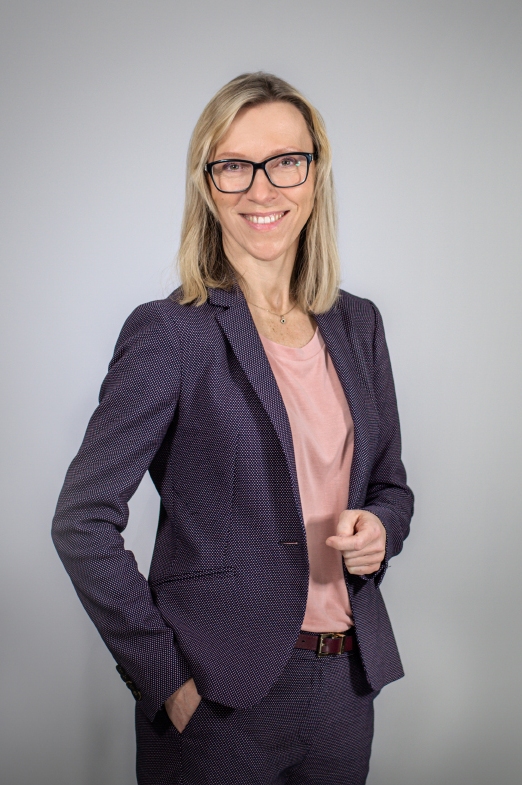 |
“Each solution that we develop in the Centre can be compared to a plant. We will give it to you, and you will decide if you want to take it, enjoy it and take care of it” |
When you are part of the Interdisciplinary Centre for Staff Development, you can take up many fascinating subjects, for example related to human functioning at work. Such topics are particularly interesting for Dr. Małgorzata Chrupała-Pniak, who combines the roles of academic teacher, scientist specialising in psychology of work and management, as well as Deputy Head of the HR and Internal Communication Department at the University of Silesia in Katowice. Based on such diverse experience, she supports the activity of ICRK intended to improve teamwork processes and evidence-based HR management.
Let us talk about the University and different roles that we can take. You’ve had the opportunity to watch the university reality from the perspective of a student, a doctoral student, a teacher, a researcher and an administrative employee. What has this diversity of experience given you?
I’m a work and organisation psychologist. I’ve been watching the way a human being functions at work for several years now. However, our previous knowledge was based on a slightly different reality. Our lifestyle and communication methods have changed, and we can use many new tools and technologies, which affected our behaviours at work. The Polish higher education system where we operate as university representatives has also changed. Due to this, I’m convinced that we should increase, modernise and systematise our knowledge about how we function at work.
What does this mean in practice?
Something interesting is happening to our work time, depending on the role we have. Each of us has their own rhythm, and these rhythms are so different that we sometimes find it difficult to fit together into a harmonious whole that a university should be.
We know that the work of our researchers frequently intertwines with their private lives. I have experienced this myself when my main role was to conduct scientific research and I could see how difficult it was to separate these two aspects of life. As researchers, we prepare and watch the course of experiments, spend long hours in laboratories, studies, with a book in our hands or over a diagram… To a large extent, such work is not controlled from outside. A scientist has certain freedom to organise their work time, think about their work and take action. This gives them a very comfortable psychological position which can be compared to having power. Research has confirmed that people in the position of power are better at handling difficult complex tasks, they are also in a better mood and have higher cognitive skills.
On the other hand, support staff have pre-defined work hours, scope of duties and significantly less capacity to set their own tasks – they are in a much less comfortable position of being subject to authority. Experiments have shown that such individuals more frequently feel negative emotions, are worse at handling complex tasks and react with fear. Therefore, the traditional division of university employees into academics and non-academics is a real challenge for work psychologists. This is not a model based on partnership and cooperation.
When I see these problems, I wonder if we can offer certain solutions, perhaps new work models that would make all of us (researchers, teachers and support staff) work better.
There is, however, a lot of uncertainty in these considerations. ‘We wonder’, ‘we would like to’, ‘perhaps something can be changed’… Where do such hesitations come from?
First of all, it is very easy to ignore certain significant issues when changes are proposed. Secondly, it’s usually difficult to convince scientists and support staff to test other work models. Not to mention the introduction of certain system solutions. Employees are usually sure that the routines based on which they’ve been working so far are the best developed model. And we, supported by professional knowledge resulting from scientific research, would like to offer them different solutions, maybe advise something, show other possibilities… Such changes do not have to be revolutionary.
Is it possible to have a common work pattern in a structure such as a university?
I think that this cannot be done unless we understand one another, or more precisely – unless we understand what our work is like.
Let me give you an example. According to the current work rules, we can start administrative work between 7 and 9 AM. I personally prefer to begin at 9 AM. Does this mean that my office is to be closed until 9? No, because perhaps my colleagues want to work in their own rhythm. We always have to search for compromise and adjust the work pattern to specific actions and tasks. The hours when we receive customers or organise meetings are also set for a reason. There are many tasks that require concentration, and every visit effectively distracts me from thinking about the duty which is assigned to me.
I could find similar examples with reference to the work of researchers and teachers. If we are aware of such rhythms, it will be easier for us to understand others, and maybe we will learn to respect their time and work more.
There is increasing talk of the advantages of teamwork and remote work options. What else can we offer to the individuals associated with the University?
It seems that the teamwork potential at universities is completely unused. This is confirmed by the relatively low share of scientific publications in this field when compared to research on teamwork in other industries. In our Centre, we would like to offer a package of options to be used by researchers, teachers and support staff associated not only with our University, but more broadly, with the Polish higher education sector. Sometimes these include some minor solutions which we wouldn’t perhaps even think of on a daily basis, and which, to an extent, make it easier for us to perform the entrusted tasks, improve the atmosphere and reduce certain mental workload.
It is good to learn from others, especially from the companies which allocate a higher budget for taking care of their employees.
We are familiar with such solutions. It’s a great idea to have more green areas, relax rooms or spaces for integrating employees from different departments or teams.
We can make some changes right away. Let’s get up from our workstation, don’t sit at the computer without a break for several hours. It’s enough to put the printer at some distance away from our desk to motivate us to move. Let’s enjoy the company of other people during the breaks. Let’s create the working space where we will feel good.
Another simple solution would be to give employees green plants, because greenery has a great effect on us: it helps us unwind and lets our eyes relax, cleans the air and reduces stress. I could go on like this forever…
But we have to take care of these plants. What we see then is a beautiful image of mutual care that we should aim at – the University takes care of me, of my well-being, of my working comfort, while I take care of what I get.
The tools that we are developing in the Centre will be a metaphorical plant. We will give it to you, and you will decide whether you take it, enjoy it and take care of it.
Thank you for the interview.
|By Dr. Małgorzata Kłoskowicz|






